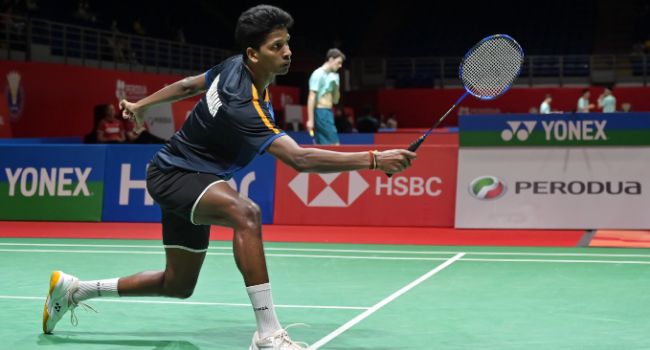
Sathish Kumar Karunakaran and Ayush Shetty from India progressed to the second round of the Hylo Open 2024 badminton tournament held in Saarbrucken, Germany, on Wednesday. Sathish Kumar, who is seeded seventh at the BWF Super 300 tournament, came back to win against fellow Indian player Chirag Sen with scores of 20-22, 24-22, and 21-17 in a match that lasted one hour and three minutes.
The 23-year-old Sathish Kumar saved a match point during the second game after losing the first. In the deciding game, the score was level at 10-10, but he then went on a run of eight consecutive points, securing his place in the round of 16 against England’s Harry Huang, who overcame former junior world No. 1 Sankar Subramanian with scores of 19-21, 21-11, 21-11.
Ayush Shetty, who claimed a bronze medal at last year’s Junior World Championships, defeated Joakim Oldorff from Finland with a score of 21-12, 21-17. The 19-year-old Indian athlete is set to play against Italy’s Giovanni Toti in the round of 16.
Tharun Mannepalli from India did not advance to the next round after losing to Austria’s Collins Valentine Filimon with scores of 21-19, 21-19. In the women’s singles category, Keyura Mopati, who qualified for the main draw, was defeated by Denmark’s Anna Siess Ryberg with scores of 21-8, 21-12.
Later in the day, Sathish Kumar Karunakaran competed alongside his mixed doubles partner Aadya Variyath. The fourth-seeded Indian duo triumphed over Scotland’s Adam Pringle and Rachel Andrew with a scoreline of 21-14, 11-21, 13-21. Malvika Bansod, who is seeded sixth in the women’s singles, is scheduled to face Denmark’s Irina Amalie Andersen in the round of 16 on Thursday.
Lakshya Sen, a semi-finalist at the Paris 2024 Olympics and the last Indian to win a title at the Hylo Open in 2019, along with two-time Olympic medalist PV Sindhu, will not be competing in the tournament.
BWF’s flagship Shuttle Time initiative aims to provide every child the opportunity to play badminton throughout their lives. In certain instances, the chances it generates allow children not only to participate but also to aim for badminton at the highest levels—including the Olympics. Two notable examples for Paris 2024 are El Salvador’s Uriel Francisco Canjura Artiga and India’s Tanisha Crasto. Artiga’s path began on a dirt court behind his mother’s house in rural El Salvador.
His stepfather, a significant figure in the badminton community, started conducting a BWF Shuttle Time program weekly, and Canjura eagerly took part. By the age of 15, he chose to seek greater opportunities. He left his hometown to move to the capital and train at the National Institute of Sports.
Crasto’s experience was quite different. Growing up in Dubai with Indian parents, she started playing the sport at the age of five, accompanying her father to his club. As a gifted young player winning local competitions, Crasto was recognized among a group of schoolchildren who participated in BWF’s Shuttle Time program in Dubai, which coincided with the commencement of the Dubai World Super Series Finals in 2014.
It was a dirt court with lines painted with white ash—I remember my mom getting up every morning with my stepfather to draw it. I enjoyed playing there, and it made me stronger in the end. It gave me better footwork and made me stronger in the legs, Artiga admitted.
I was winning a lot of tournaments in Dubai, so they knew I could go to the next level. We could meet the top players like Srikanth, Saina, Sindhu, and even Peter Gade. All of this was because of Shuttle Time Dubai. For us, it was a lucky moment to get to meet such world-class players, said Crasto.
